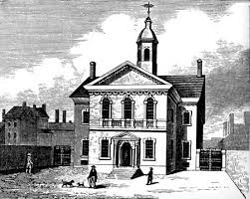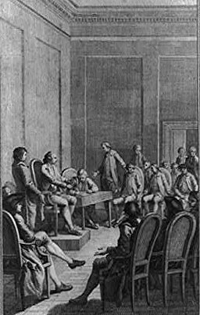The Continental Congress was a gathering of representatives from America's 13 Colonies that served as a nominal federal government before and during the Revolutionary War, from 1774 to 1781. The Congress had two main meetings and several subsequent ones. The main impetus for the formation of the Continental Congress was Parliament's passage in 1774 of the Intolerable Acts, which, among other things, closed the port of Boston and imposed martial law. Not surprisingly, the Sons of Liberty, who were in the habit of agitating for radical solutions to colonial problems, called for a boycott of British goods and of general civil disobedience. Some colonial merchants, wary of losing some of their biggest customers, wanted a clear set of objectives and a set of mutually agreed on principles to which all colonists could look. The result was the Continental Congress. Colonies chose delegates to attend the Congress in different ways. Some states had their colonial assemblies choose the delegates; others had a general election; others had an open meeting. 
A total of 55 delegates from every colony except Georgia first gathered on Sept. 5, 1774, in Philadelphia's Carpenters Hall. (Georgia did not want to alienate the British soldiers whose help they needed to stave off attacks from nearby Creek Native Americans.) Peyton Randolph was named president, and Charles Thomas was appointed secretary. The delegates discussed their disagreements with Parliament and suggestions for how to resolve them. One key debate very early on had to do with representation in the Congress itself. Delegates from states with higher populations insisted that they should have more influence on whatever votes the delegates were going to take because they represented more people. Delegates from states with smaller populations sought equal representation for all. After much discussion, the delegates agreed that each colony would have one vote. The key point of distinction in the Continental Congress is that the delegates did not advocate independence at this point. Rather, they wanted to present their concerns to Great Britain with a united voice, in order to encourage Parliament and the king to acknowledge those concerns. The first major action taken by the Continental Congress was to discuss a plan by Pennsylvania delegate Joseph Galloway for the implementation of an American parliament. The beginning of Galloway's Plan of Union of Great Britain and the Colonies included this reinforcement of the idea of conciliation: "Resolved, that this Congress will apply to His Majesty for a redress of grievances under which his faithful subjects in America labor; and assure him that the colonies hold in abhorrence the idea of being considered independent communities on the British government, and most ardently desire the establishment of a political union, not only among themselves but with the mother state, upon chose principles of safety and freedom which are essential in the constitution of all free governments, and particularly that of the British legislature." 
The delegates were initially divided on whether to support such a plan, and a final decision was rendered moot by the report of the Suffolk Resolves, a set of meetings in Massachusetts that took things one step further, arguing the following:
These issues became part of the discussions of the Continental Congress. As with Galloway's plan, the delegates split initially on whether to support the Suffolk Resolves, the report of which had been delivered to the Continental Congress by noted horseman Paul Revere. After much debate, the delegates on September 17 endorsed the ideas espoused in the Suffolk Resolves. On October 20, the delegates released the Articles of Association, which, among other things, gave Great Britain a deadline of December 1 to repeal the Intolerable Acts; if that deadline passed with no relevant action taken, the Congress vowed, colonists would begin their boycott. As a further pronouncement, the colonists vowed to place an embargo on exports if Parliament didn't act before September 10, 1775. On October 26, the Continental Congress delegates put together a formal petition stating the grievances that the colonists had against King George III. This was the "Declaration of Rights and Grievances." The delegates addressed their letter to the king and not to Parliament because they thought that Parliament was to blame for the passage of the Intolerable Acts. The last thing that the delegates did before adjourning was to set a date on which to reconvene: May 10, 1775. Next page > The Second Continental Congress > Page 1, 2 |
|
Social Studies for Kids
copyright 2002–2026
David White


